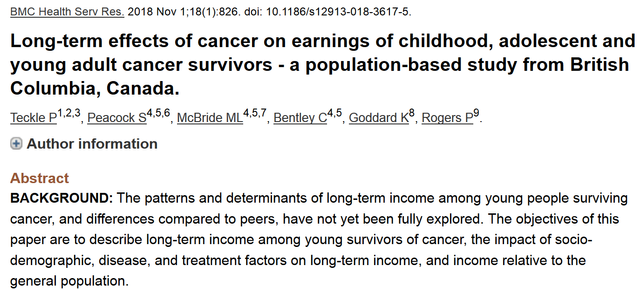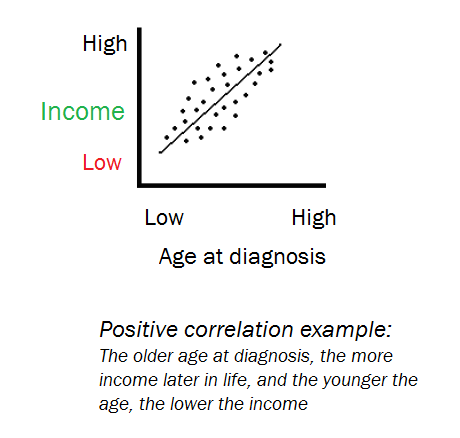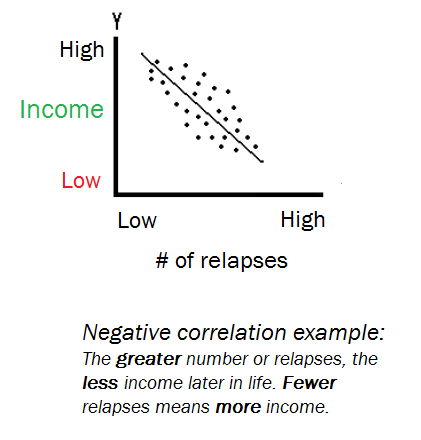Childhood Cancer Survivors Suffer Economic Hardship as Adults
A population-based, long follow-up study was funded by the Canadian Cancer Society and BC Cancer Agency (BCCA) to "assess long-term income of childhood cancer survivors relative to the general population".

Data Collection:
Data on survivors, patients diagnosed between 1970 and 1999 before age 25, was gathered from the BCAA registry, specifically the Childhood, Adolescent, and Young Adult Cancer Survivor (CAYACS) Research Program database, as well as Statistics Canada data and income tax and Child tax benefits records from the Canada Revenue Agency.Findings:
This population-based, long follow-up study showed that childhood, adolescent, young adult cancer survivors earned significantly less than the general population of BC.
Certain factors, such as age, sex, marital status, demographic, type of cancer and treatment are all factors that affect income later in life.
BC patients from Vancouver or the Fraser Valley were treated in their hometown while patients in rural BC have to travel to Vancouver. Those who had to travel from rural BC to Vancouver instead of receiving treatment in their hometown, suffer more economic hardship later in life
Positive Predictors of Income
Positive predictors mean they rise and fall with income. High levels of a poisitve predictor means higher income, and vice versa, low levels of a positive predictor mean lower income. The positive predictors of income are:

- Age at diagnosis (younger age at diagnosis predicts lower income later in life, and older age at diagnosis predicts higher income)
- Metropolitan demographic (survivors from small, rural areas make less than those from metropolitan/urban areas.
- Current age (young survivors make less with the exception of females)
- Educational attainment (especially at time of diagnosis)
- Received treatment in hometown
Negative Predictors of Income
Income and these factors diverge - More (or all) of these is associated with less income, and less (or none) of these is associated with higher income. Negative predictors of income are:

- Current age of female adult survivors
- Single females
- Radiation therapy (especially to the CNS and without other treatment)
- Number of relapses
- Central Nervous System (brain and spine) tumors
- Rural Demographic
- Had to travel from elsewhere in BC to Vancouver for treatment
"Neurocognitive impairment and negative emotional and psychosocial late effects, poor educational outcomes, and higher odds of unemployment after treatment for CNS tumors is common in survivors. The lower income observed in this study is likely to be attributed to the multiple, severe long-term health problems survivors of CNS generally experience. Particular attention should be given to those previously treated for CNS tumors and to those who received radiation therapy Economic inequality can only be associated with hardship for survivors"
Source: Teckle P., et al (2018). "Long-term effects of cancer on earnings of childhood, adolescent and young adult cancer survivors - a population-based study from British Columbia, Canada". BMC Health Services Research. Vol. 18(1), Pg. 826. doi: 10.1186/s12913-018-3617-5. Read Abstract | Read Full Study
It's so freaky to read a study that is about your life. Here's my personal story to go along with the numbers:
I am almost all of these things except I'm still young, not single, and I had surgery in addition to radiation. My hometown in Northern BC had very little options for education and employment. Growing up in a small isolated town hundreds of km from the nearest city (Prince George) to low-income parents was the first set back. In a town like that you either work a minimum-wage job or you go away to get a degree and come back as a nurse or teacher or something.
The college offered some 100 and 200 level university classes of very limited selection, trades, and nursing. I did a year of college there, while I worked to save some money for university. I couldn't stand living at home anymore and working minimum wage was just burning my wheels more than helping me save, so I left for University in the lower mainland, and survived the whole thing on a student loan.
It was difficult working and studying in high school and college while starting to experience the effects of radiation (hypothyroidism, insomnia and metabolic problems). So, I thought I would worry about a job after I had a degree, but all entry level jobs wanted at least a year's work experience, and expected you to drive, be healthy, etc. Even if they didn't mind that you take the bus, it adds hours onto a day that was too long for me to handle.
And of course I would have to "not be a cannabis user" for this job, meaning I would get sicker...All for a job that pays not much more than minimum wage that student loans is going to want half of each month anyway? So why didn't you get hooked up with a government job that accepts your disability? Well, first off, cannabis and my disability go hand-in-hand, and my cannabis use had never been acceptable even though I had muscle spasticity from SCI, neuropathy, and cancer. So I was a closet medical user.
I was raised all my life to believe I didn't have a disability or sickness (other than scoliosis), and that's how I acted and therefore how I got treated. I did need some accomodating, and if I had had that mindset maybe things would be better off. I got a university degree which is a lot more than a lot of childhood survivors attain, I just didn't use it to make an income. I'm just using it to put research on the blockchain hahaha! :D
That was also the time we were being abused by his drunken, drug-addict brother, sharing a basement and half bathroom with him. It was often hard to get enough sleep (especially on weekends or his benders or "sick days"), make proper meals, or work or medicate in peace. On top of all his benders, slander and blackmail about us, we were taking care of Grama, had to do all the chores he pretended to do, clean up after his drunken benders, and do all of Grama's errands ON FOOT because he was too drunk to drive and wouldn't let @Drutter use the car. Excuses aside, I felt like I was set up to fail...cut off from student loans, not being able to drive, being a closet medical user, not being able to work a full day/week, and not magically having a year of post-graduate work experience at the time of graduation, and living. Here's a recap of where I think things went wrong for me.
- Growing up in Northern, isolated town to low-income parents, so going to University was harder and more expensive
- Missing too much grade school because of treatment (especially subjects like math)
- Not receiving disability benefits when I became an adult (student loans instead)
- Educational requirements changed while in college from needing a BA to needing a MA
- Treated my education as such, and didn't "play the game" and "work the system" in college
- Couldn't handle a double workload (but didn't know I had hypothyroidism)
- Living with D's brother in the critical job-finding period after graduation
- Didn't accept disability and acted like and told other people I was healthy
- Limited options because of limited skills (bad balance, mobility, coordination, limited endurance, etc)
If I could go back and do things again knowing what I know now, I would recognize and accept my disability, and receive the benefits for it instead of student loans. I also would have made my parents enroll me in French immersion, because language was one of my only interests left after I'd been stripped of most of my physical abilities. Most importantly, I would have started doing medical cannabis research and demanded my rights as a medical cannabis user starting in my teenage years!
Another great medical article with links - thank you!
@MediKatie, you're singlehandedly and significantly increasing the medical knowledge on the Steem blockchain!
Yes indeed!
What you should have done too was start taking cannabis oil as a kid, that would've taken care of "factors" like number or relapses.